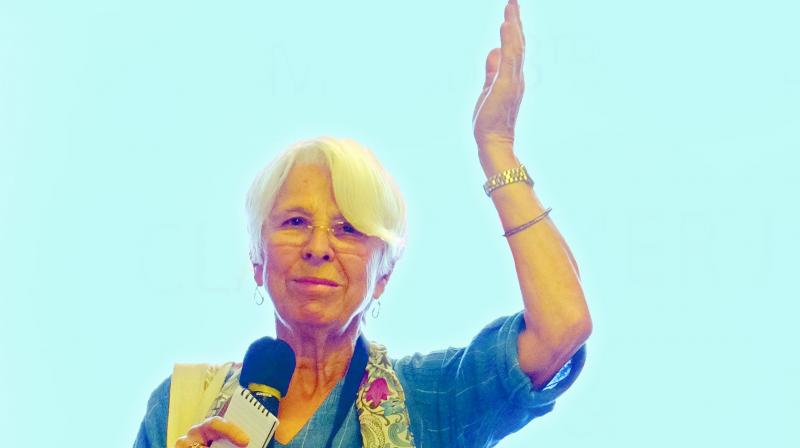Threads of faith

In 1967, a young British woman, disillusioned by the unstable socio-political climate of England and looking to make her mark on the world in a meaningful way came to India and fell in love with the colours and patterns of the textiles created by the local artisans of Rajasthan. She along with her husband John started Anokhi when the craft of hand block printing, once a thriving business in the state, was dying a slow death. To save it from extinction and resurrect a sustainable livelihood for those who create hand-printed fabric, they began working with the local artisans.
Today, the brand employs women mostly from the under-privileged sections and focuses on fair trade and people’s welfare. Apart from taking care of those employed with them, the duo also launched a support system for performing artists.
“Handmade textiles and prints were disappearing from the market when we started. Now, it’s a very important part of the state’s textile industry,” says Faith, who was also instrumental in starting the Jaipur Virasat Foundation that birthed the Jaipur Heritage International Festival. It later transformed into the Jaipur Literature Festival, the city’s flagship literary event.
“We intended to become the mechanism through which traditional craftsmen and artisans could benefit from the modern world,” says Faith.
She reveals that back then, she and her husband were just a regular couple looking to earn a modest living, with no intention of founding a global brand. “My husband wanted to build a business out of my designs, and we had to earn a living, so we started in a very modest way, without any ambition,” she says.
But soon, they became synonymous with quality Indian crafts in several European markets, and it motivated Faith to dedicate herself to the welfare of her artisans. “Starting a company based on people having a particular skill was a learning experience. We certainly did not know where we were going back then,” she says.
The country’s fluctuating economy and the wide-spread acceptance of ready-made, mass-produced apparel didn’t make matters easy for her, but her husband John helped her face every practical challenge with confidence. “People started appreciating our handmade cotton stuff only in the late 1980s,” she says.
“It has given me an opportunity to realise how much beauty and art is there, and to see different worlds coming together to become a single global community. I think that’s been my learning,” she says.
Another of Faith’s initiatives that have had a lasting impact, is the Jaipur Heritage International Festival a festival dedicated to folk musicians and artists. Faith says that she wanted to start a festival that would involve as many people as possible and bring global recognition to Jaipur’s exquisite architecture. “My husband was a passionate music lover and the state has such diverse music,” she says.
She adds that she wanted to keep it accessible to everyone. “We always wanted the festival to be for everyone, not just people who are well-off,” she says. Faith was forced to step away from the Jaipur Heritage International Festival when bureaucracy got in the way. “It’s difficult to keep something like that stable with changing governments,” she says, revealing that the then-government wanted her to change the dates. “We couldn’t change the dates because it would be too hot at the time they wanted it, so we handed the festival over to the team that currently runs the Jaipur Literature Festival,” she adds.
Faith’s love story with India is not over just yet. She is working for rural artists along with a music museum in Jaipur, that’ll be open from October this year.
Of her journey, she says, “I was very fortunate to have stepped into Jaipur, married John, made a home for myself here and started working with block printing,” she concludes.

